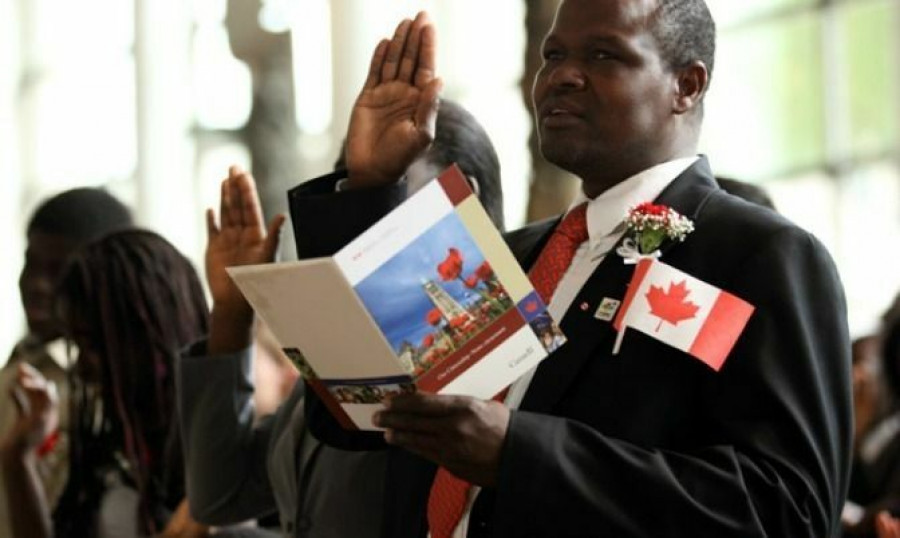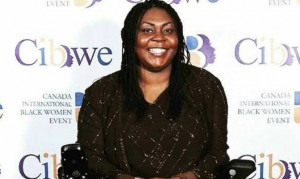In the movie Selma, Dr. Martin Luther King campaigned to secure equal voting rights via an epic march from Selma to Montgomery. Subtract the intense race relations, and obstacles faced back in 1965, many Black Canadians voluntarily do not have the right to effect change in Canada either.
The reality is that many people of Caribbean descent are still Permanent Residents, who have not taken the next step to become Canadian citizens. An unfortunate fact Keith Merith and Audrey Walters discovered several years ago and decided to form a group to address the issue.
How did this project get started in the first place?
It is quite interesting how it got started, our co-founder Audrey Walters, back in 2011 was running as the member of parliament for the Conservative party and she put a team together which I was a part of. We went out canvassing the area she was running in York West; better known as the Jane and Finch corridor.
When we were out canvassing, something quite disturbing happened. We met a lot of people, Caribbean nationals, members of the black community, and when we spoke to them, they had been permanent residents of Canada for 5,10,15, 20, 25, 30 years. A lot of them never took the next step towards citizenship. And of course what that really meant in essence was, they weren’t availing themselves of the benefits of citizenship, and also they didn’t have the right to vote. That was very disturbing to us. Some of them were very astute and engaged but didn’t have the right to put their X on the box to try to influence or change their course or status in life. That’s where it really came from. Audrey and I after the election sat down and said man, what’s going on here. We need to do something about this and we don’t need to talk anymore. We need something structured, we need something tangible, measurable, that we can have some results at the end of the day. Enough talking. So, that’s where we came up with it, the two of us we sat down and said let’s put an initiative together, and see what we can do to make change absolute positive. Measurable changes in our community. And that’s how we put the group together.
How many people are involved in the project?
So, we have 8 core members right now. When I say core members, they are responsible for building the presentation. They are the ones that are directly 100% engaged in this, and they are all volunteers.
Then we have what we call an inner circle and that is a number of Bishops through the churches, we call them the college of Bishops, and also the Caribbean Consul Accord. They act almost as if they were a steering committee in essence. They give us guidance, directions and also they are responsible for bringing and introducing their congregation and constituents to this initiative that we are doing. It’s about 20 people that are involved in the inner circle to date.
What are the organizational goals?
The real objective for us, and it’s basically our mission, is to inform and encourage permanent residents to obtain their Canadian citizenship, and the kind of goals and objectives we have, we set ourselves up for a 5-year delivery.
We will get people that are qualified to make Canadian citizenship a priority and to really understand the importance of civic engagement. We want them to utilize all the benefits that come with Canadian citizenship; so it’s not just the fact to vote but it’s other benefits that are really substantial that our people should be taking advantage of. In the end, it’s about what we can do as a community to effect real, tangible change. You know, it’s about having the right to change the political atmosphere or the political landscape of this country, if need be, right? What would make me smile is if our numbers increase in terms of members of our community that we could influence when we needed something done or need something to changes. We need representation in all levels of government, in all parties. So, it doesn’t matter who’s in power, we have representation there. Rather than having people dictate to us, they are sitting around the table dictating to us, on how you should live, and what you need to abide by. We can have an influence at that table and say, wait a minute that might be something you are looking for, but it really doesn’t help my community much. Have a voice, a voice at the table. That’s what we are looking for.
Is this initiative based in the GTA only, or is this Canada wide?
That’s a great question. It is based primarily in the GTA right now. That’s because it’s a new initiative. That’s where our core members live and the constituencies that we are dealing with are. But in the 5-year plan, we hope to expand it as far as it can go, and we’re talking across the country.
Do you think this is a Black, Caribbean problem or do you see all ethnicities having the same status? Compared to say, people of Chinese or South Asian backgrounds, do you find that many immigrants across the board are not obtaining citizenship?
Well, you know I just am going to go out on a limb because I don’t have any specific stats on that. But just from what I hear, what I see, I believe that the Caribbean nationals, the Black community in general, is way behind many other ethnic communities. They make it a priority that their citizens, their people come into Canada, as soon as they are eligible to apply for Canadian citizenship, they do. I don’t see that happening in our community.
Take the Indian community or the Chinese community, for instance, that have been here for a relatively shorter time than we have, but have benefited from or influenced the landscape of this country far greater than we have in terms of politics.
You will see representation at every level, in every party, in the seats of government in this country from other ethnic communities. You don’t see it here with us. It’s just not there. To answer your question, I believe, I really truly believe that we are lagging behind in this and really and truly, we get platitudes from the politicians. We do. But, the other communities will get substance and the reason is that they know that we don’t have the numbers to vote or we don’t vote. They know that. So, they will shake your hand, and smile and nod, but they are going to spend most of their time in the other communities that have that power to change their status. Just a fact.
Why do you think people in the Caribbean community tend not to become citizens? I’m getting the sense that sometimes even with this information they still don’t take the necessary steps?
Yeah, a really good question. What I see is, is a couple of things. I see complacency in our group. I see a lack of information. I see it could even be a money situation where you have to pay, to advance your status. You have to pay for your kids and you have to pay for your significant other and so on and so forth. So money is the real concern, although it’s not a lot of money it still could be a factor. I don’t see a lot of what I would call civic engagement and if you are more woven into the fabric of the country, chances are you would be more civically engaged. I don’t see a lot of that. I see there are a few of us in the community that have been for a long time. There’s even a few us that are in the community that are actually doing something worthwhile rather than just chat. Rather than just talk. I don’t see a lot of that real substantive civic engagement. I can’t put my finger on any one reason why they are not advancing their status. I don’t know. It’s strange.
How can people get more information about the organization?
People can contact us to get more information at 416.225.4673.
Is there anything else that you wanted to share in terms of information?
There’s a lot of information. What I would do is encourage people to come to one of our presentations. It’s about 40-45 minutes and speaks to why you should be interested in obtaining your Canadian citizenship.
The second part of what we do, is we basically handhold the people that are interested and qualified, through the application process. Because, what we do know is that if you do not fill out the application properly, and you submit it and it’s rejected, when you resubmit you are at the back of the line again. We don’t want that to happen so we will handhold the people right through that process to make sure that they get through the first time in terms of the application.
The third part of what we do is facilitating citizenship ceremonies. So it’s a three-part operation where we will be there with you from the introduction to where you are holding the flag.




